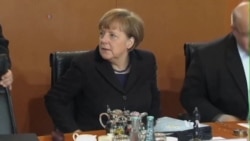Some observers say Germany has the makings of a world power. They note the German government’s lead in trying to solve the European financial crisis. They also point to German involvement in diplomatic efforts to stop the war in Ukraine. But other observers wonder whether Germany is ready to get more involved in world events.
Germany is the largest economic power in Europe. The country has never been as economically strong, secure and free as it is today. Germany is the fourth-largest economy in the world, and one of the top exporters.
In the 24 years since Germany was unified, it has become the most valuable European partner of the United States. But it has been, and is, reluctant to take the lead in world events.
Stephen Szabo is the executive director of the Transatlantic Academy research center. He wrote a book called “Germany, Russia, and the Rise of Geo-Economics.” He says Germany is now deciding its future.
“It's the whole idea of being an economic power, not a military or strategic power. Will Germany stop being a big trading state that('s) concerned only about trading, or will it now begin to rebalance?"
Stephen Szabo says it will not be easy for Germany to become a great power. He says the 2009 debt crisis in Europe caused a shift in political power on the continent. The debt crisis forced a number of European countries to cut government programs and make other financial reforms. Mr. Szabo says these measures led to a rise in extremist groups. He says the extremists do not agree on many issues except their dislike of the steps Germany has required as a condition for economic help.
“I think there's been a certain arrogance about: ‘We have the right way -- you should just follow our way.’ This is something that they're gonna have to address.”
Reinhard Bütikofer is a German politician and a member of the country’s Council on Foreign Relations. He says the German military is an important part of NATO’s new rapid-response force. The alliance decided to create such a force after Russia’s actions in Ukraine. Mr. Bütikofer says the German military also is expanding into other areas.
“And the Germans, who are never very eager to sort of get involved militarily, have put troops into some of the Baltic countries, helping these countries that have very weak military protection of their own.”
Germany is also giving weapons to Iraqi Kurdish forces for their operations against Islamic State militants.
Experts say whether Germany will become a world power depends on the strength of an international political system supported by Western power. They note a lot of that support is now coming from Germany.
I’m Christopher Jones-Cruise.
Jela de Franceschi reported this story from Washington. Christopher Jones-Cruise wrote it for VOA Learning English. George Grow was the editor.
______________________________________________________________
Words in This Story
unify – v. to cause (people or things) to be joined or brought together
reluctant – adj. feeling or showing doubt about doing something; not willing or eager to do something
strategic – adj. of or relating to a general plan that is created to achieve a goal, particularly in war, politics or business, usually over a long period of time
shift – n. a change in position or direction
arrogance – n. an insulting way of thinking or behaving that comes from believing that you are better, smarter or more important than other people
response – n. something that is done as a reaction to something else
eager – adj. feeling a strong and impatient desire to do something or for something
Do you believe Germany should play a larger role in world affairs? Does Germany influence your country? We want to hear from you. Write your thoughts in the comments section.





